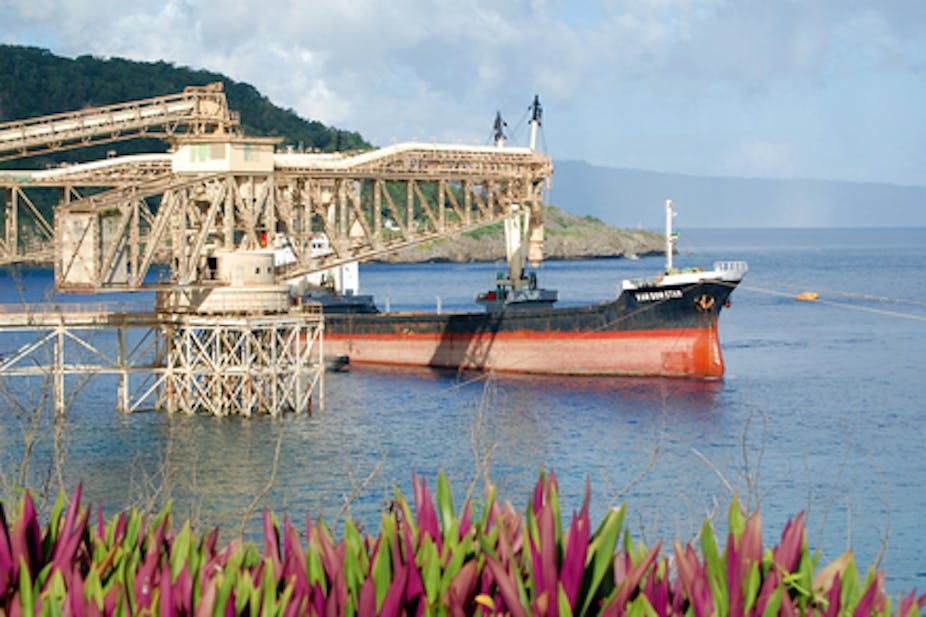Australia could be doing more to regulate the activities of Australian companies operating abroad. In the past decade a handful of troubling cases have been reported connecting Australian mining companies to serious human rights abuses overseas.
The muted domestic response to these allegations may reflect a lack of legal avenues to bring Australian companies to account and/or a reluctance to use those avenues currently available. But whatever the cause it is a source of concern.
For example, in 2005 the ABC’s Four Corners program broke the story of Anvil Mining in the Democratic Republic of the Congo. It was alleged that in October 2004 Anvil assisted the Congolese armed forces in a military operation that resulted in the massacre of civilians.
According to a United Nations’ report, the operation was a disproportionately violent reprisal against a small and poorly equipped rebel group. The rebels’ demands included that more of the wealth from local resources should flow to the local community. During the violence at least 73 people were killed, 28 of whom were summarily executed. Other violations included rapes, looting of civilian property, arbitrary detentions, and the disappearance of detainees.
For its part, Anvil was criticised for providing vehicles and personnel essential to the operation. It was alleged that Anvil vehicles were used to transport detainees, corpses and goods. And that the company also provided food rations and payments to soldiers.
After the public exposure the Anvil case received, some members of the armed forces and three Anvil officials were brought before military trials in the Congo on charges of war crimes. All were acquitted.
Should Australia have some responsibility in cases like this one, particularly if it is alleged the trial overseas has been subject to political interference?
Few people are aware that in 2002 Australia introduced laws that allow the prosecution of Australian companies for certain serious crimes committed overseas. Under the Commonwealth Criminal Code, Australian companies can be prosecuted in Australia if they participate in war crimes, crimes against humanity or genocide anywhere in the world.
These crimes do not encompass all human rights abuses. For this reason these laws go only part of the way toward ensuring that Australian companies are bound by comprehensive human rights concerns in their operations abroad.
The application of one country’s domestic law to events that take place elsewhere has always been controversial. However, as our world is increasingly globalised, domestic laws that operate beyond a country’s borders have become more acceptable.
This is particularly true where the laws deal with behaviour that is especially offensive to our shared values. It is further justified where the country in which the offence has taken place is unwilling or unable to genuinely address the matter, as is the allegation in the case of Anvil.
The Australian Federal Police investigated Anvil under the Commonwealth Criminal Code. The investigation was closed and no charges were laid.
However given the criticisms of the Congolese trials, we should ask if the failure to pursue the matter might imply reluctance on the part of Australian authorities to apply these laws even where to do so could be defended.
By contrast there are instances where Australian authorities have been willing to exercise extraterritorial powers. In 1994 Australia outlawed the sexual exploitation of children by Australians overseas. This includes engaging in sexual intercourse with children under 16 years of age overseas or grooming a child for sexual exploitation.
These sex tourism laws were introduced as a response to Australians travelling abroad for the purpose of sexually exploiting children. Since then, prosecutions have taken place concerning children in Thailand, the Philippines, Ghana, Cambodia and even the United States. There is evidence that, with political will, prosecutions of extraterritorial crimes can and are taking place.
Since the case of Anvil, more recent allegations of human rights abuses connected to the Australian mining industry abroad are again making news. Melbourne-based OceanaGold has come under fire, for allegedly illegally and violently demolishing almost two hundred homes in 2008 and 2009 to clear land for its operations. According to a report by the Commission on Human Rights of the Philippines, the company’s scheme has been one of “demolish now, negotiate later”.
The Commission has recommended to the Philippine Government that it revoke OceanaGold’s right to mine in the area. But it is not yet clear how the Government will respond. With developing countries like the Philippines relying more and more on direct investment from foreign corporations, a robust response seems unlikely.
Under the Criminal Code, Australia already has domestic laws that could be brought to bear to investigate claims of rogue behaviour by its corporations abroad. Accused Australian companies would then have the opportunity to clear their name or answer for their wrongdoing. But for these laws to positively influence corporate behaviour they must be used in the right circumstances.
We have seen extraterritorial Australian law applied to individuals in the field of sex tourism. But as yet extraterritorial regulation has not been brought to bear in the corporate context.
Additionally, the existing Australian laws cover only a small range of human rights abuses. Cases like Anvil and Oceana Gold that involve allegations of serious human rights abuses may nonetheless fall short of such crimes.
Oxfam Australia has called for an extension of extraterritorial laws to ensure Australian companies are bound to respect the full range of human rights within their arena of operations. Last year a Canadian Bill that echoed this sentiment was only narrowly defeated.
Whether through the application of existing laws or the extension of new ones, it remains to be seen whether Australia will step up to the plate and shoulder more of the responsibility if Australian companies violate human rights abroad.

